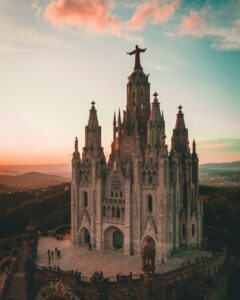Father Chet, March 1974
One of the most valuable insights of modern times is the increased appreciation of the dignity of humankind. For some, this appreciation has gone to the extreme of autonomy and independence from all law and restraint. However, its finest expressions are seen in a better understanding of the responsibility which we have toward the course of worldly events.
While certain areas of life are indeed beyond our control, most people, whether they are believers or not, realize that both the present and the future are very much in our hands. The immense increase in knowledge and power in our time adds greatly to our freedom and our responsibility.
Realizing Responsibility
The realization of our freedom, dignity, and responsibility is not really new. It goes back to the very beginnings of God’s revelation to the Patriarchs and is symbolized in the first chapters of Genesis when humankind is entrusted with the dressing and keeping of the Garden of Eden.

The ancient Israelites came to this realization in the desert when it was revealed to them that they had to make a choice about their future destiny, and that blessings or curses would inevitably follow, depending on their choice.
To emphasize their freedom and responsibility, they were commanded to gather each year at the foot of Mount Gerizim and Mount Ebal. From Mount Gerizim, the blessings that would follow if they chose the way of the Lord were to be read. From Mount Ebal, the curses that would follow their rejection of God’s law were to be shouted.
Throughout the Old and New Testaments, our personal responsibility is given a growing emphasis. The incarnation of God in Jesus is the climax of this revelation of greater and deeper insights regarding the consequences of this freedom and responsibility.
Freedom’s Mixed Blessing
Freedom is a mixed blessing. Along with increased dignity, there is an added responsibility to take control of our destiny and that of the world, always with an eye toward its proper goal – the Kingdom of God.
This struggle requires laborious and persistent effort on our part. That’s why most of us are tempted to shirk our responsibilities. We like our freedom when it suits us, but when the going gets rough, we prefer that someone else assume the responsibilities.
In Brothers Karamazov, by Dostoevski, the epic poem of the Grand Inquisitor illustrates the enticement of the temptation of irresponsibility. One of the characters in the novel tells how Jesus Christ came back to earth in the Middle Ages and is condemned to death by the Inquisition. The reason given was that Jesus, as God, was responsible for the crime and evil on earth, because he gave us freedom, enabling us to sin. The Grand Inquisitor says that God was wrong to do this, and that we would have been better off if God had kept this responsibility.
Seeking Security

Charles Schultz, creator of “Peanuts,” portrays Linus’s blanket as a symbol of the external signs of security to which people cling in difficult times. For many of us, Mother Church has frequently served as our Linus blanket.
In times of difficulty, when we do not know where to turn, we are comforted by thinking that the Church has all of the answers. And, we assume, most of the responsibility for making the right decisions in matters of faith and morals. This relieves us of the responsibility of the hard work of arriving at the right answers ourselves. The Church assumes this responsibility, and we are free of this burden.
But suddenly, almost overnight, while we were asleep as it were, this security blanket was removed. We awoke to discover that the church is not omniscient. The seemingly constant changes in ways of worship, the sacraments, and other church practices, the disagreements among theologians and bishops – all of this has diffused the authority of Holy Mother Church.
Responsibility of Institutions
It is true that some institutionalized method for arriving at decisions must be agreed upon. Without it, there can be chaos and anarchy. Therefore, institutions are necessary in any complex society. Certain procedural methods must be established, and the community must agree to abide by them. Again, without it, confusion and loss of time and energy ensue.
Quality control and efficiency of operation do not happen by chance, but are the result of institutional planning and organization. These modes of operation should remain tentative and contingent rather than absolutely essential and necessary.
Becoming “Ends”
The danger is that these institutions cease being “means” and become “ends” in themselves. We lose sight of the goals for which the institutions were designed to serve, and begin to revere, consecrate, and even worship the institutions.
When we absolutize an institution, we become guilty of idolatry – worshipping and following the visible institution rather than the invisible God.
Because the institution is something visible, recognizable, and controllable by human intelligence, it is often given greater importance than it deserves. Consider the contrast of how the deeper and more spiritual values that contribute to our success in gaining our ultimate objectives are illusive and more difficult to control.
Relinquishing Responsibility
Moreover, institutions are objective and therefore usually less threatening and disturbing to our inner self-defenses than is true of challenges like personal holiness and self-responsibility.
We may give external submission to an institution like the Church, while inwardly we continue to live a self-serving life in pursuit of selfish desires and the glorification of our ego. In fact, this outward façade of obedience to the Church often furnishes a convenient cover-up for the pursuit of vain ambitions and the exercise of arrogant, sinful power.
Lifting the Veil

When the lid of secrecy lifted on the deliberations of the inner councils of the church, we gradually discovered that those in charge of making decisions did not really have any better access to the answers than any other Christian who prays and searches sincerely for the will of God.
When we read the deliberations of the Council Fathers at Vatican II, we discover that they anticipated this change in the traditional image of Holy Mother Church.
In the debates concerning the Council Document on the nature of the Church (Lumen Gentium), frequent mention was made of the need to give up the Church’s image of parental authority.
A Nourishing Mother
The Council Fathers recommended that we return to a more ancient image of the Church as a nourishing mother who, through the sacraments, gives birth and continuing sustenance to our faith. We are urged to act no longer as irresponsible children looking to the Church to decide what to do, but rather, we should assume the dignity that is ours.
As the people of God, we are called to assume personal responsibility to lead humankind to a new and higher life – the promise land of God’s Kingdom. The responsibility for making the right decisions will be fulfilled if all of us, together, work out the best solutions to our many problems.
Recognizing Ourselves
The problem facing every sincere Christian is where to find the real truth. Amid the chorus of voices competing for our attention, how can we recognize the authentic voice of God?
Many Catholics fall into thinking that we need only obey the voice of our superiors – Pope, Bishop, and Pastor – and we could feel comfortable that we were doing God’s will. Certainly, there is a centuries-old tradition which asserts that obedience to religious superiors is the safest and best way to know and follow God’s will. There is only one exception – if a superior should command something manifestly sinful.
Today, many Catholics at all levels – priests, sisters, lay persons – are inclined to consider blind obedience to superiors as below the dignity of a free person.
Our faith in God’s promise of guidance and protection to his Church is not limited to those in authority. It includes all the members of the Church – all of God’s people.
The more we learn about the methods and practices used by the authorities in decision-making, the more we realize how identical their process is to our own means of discovering God’s will.
Editor’s Note: This is the first of three installments of Fathers Chet’s writings on this topic. The subsequent reflections will continue in August and October.
